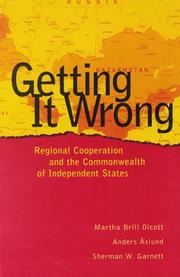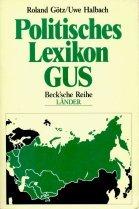| Listing 1 - 6 of 6 |
Sort by
|
Book
ISBN: 9780198702375 019870237X Year: 2014 Publisher: Oxford, United Kingdom : Oxford University Press,
Abstract | Keywords | Export | Availability | Bookmark
 Loading...
Loading...Choose an application
- Reference Manager
- EndNote
- RefWorks (Direct export to RefWorks)
This book takes four conflicts in the post-Soviet Commonwealth of Independent States (CIS) as a starting point for examining the current state of the law of self-determination and secession. Four entities, Transnistria (Moldova), South Ossetia, Abkhazia (both Georgia), and Nagorno-Karabakh (Azerbaijan), claim to be entitled not only to self-determination but also to secession from their mother state. For this entitlement they rely on historic affiliations and on charges of discrimination and massive human rights violations committed by their mother state. This book sets out its analysis of these critical issues providing a detailed understanding of the principles of international law on which they rely. The first part sets out the contours and meaning of self-determination and secession, including an overall assessment of secession within the CIS. The second section provides case studies investigating the events in Transnistria, South Ossetia, Abkhazia, and Nagorno-Karabakh in greater detail. The third and final section extends the scope of the examination, providing a comparative analysis of similar conflicts involving questions of self-determination and secession in Kosovo, Western Sahara, and Eritrea. The book concludes with a Postscript on the developments in the Crimea in February/March 2014.
Self-determination, National --- Secession --- Self-determination, National. --- Secession. --- Sovereignty --- Separatist movements --- National self-determination --- Nationalism --- Nation-state --- Nationalities, Principle of --- Commonwealth of Independent States. --- CEI --- CIS --- Communauté des Etats indépendants --- Commonwealth States --- Comunità di Stati indipendenti --- Gemeinschaft Unabhängiger Staaten --- GUS (Commonwealth of Independent States) --- Ḥever ha-ʻAmim --- Ḥever ha-Medinot ha-ʻAtsmaʼiyot --- Itsenäisten valtioiden yhteisö --- IVY (Organization) --- Newly Independent States of the Former Soviet Union --- NIS --- SND --- SNG --- Sodruzhestvo nezavisimykh gosudarstv --- Spivdruz︠h︡nistʹ nezalez︠h︡nykh derz︠h︡av --- Strany Sodruzhestva --- Tongnip Kukka Yŏnhap --- Wspólnota Niepodległych Państw --- ZND --- Zajednica nezavisnih država --- Koinopoliteia Anexartētōn Kratōn --- SovereigntyCommonwealth of Independent States.
Book
ISBN: 184966532X 1849665311 9786613479242 1283479249 1849665761 Year: 2011 Publisher: London : Bloomsbury Academic,
Abstract | Keywords | Export | Availability | Bookmark
 Loading...
Loading...Choose an application
- Reference Manager
- EndNote
- RefWorks (Direct export to RefWorks)
This volume brings together new contributions from renowned academic scholars, from experts on economies in transition and from the United Nations, the European Union, the European Bank for Reconstruction and Development as well as other international agencies. It aims to answer fundamental questions and spell out policy options to address the challenges for economies in transition. The volume includes comparative studies focusing on all transition economies, including Central and Eastern Europe, as well as regions such as Western Balkans and the Commonwealth of Independent States.
Commonwealth of Independent States. --- Europe -- Economic conditions. --- Europe, Central -- Economic conditions -- 21st century. --- Europe, Central -- Economic policy -- 21st century. --- Europe, Eastern -- Economic conditions -- 21st century. --- Europe, Eastern -- Economic policy -- 21st century. --- Former Soviet republics -- Economic conditions -- 21st century. --- Former Soviet republics -- Economic policy -- 21st century. --- Mixed economy -- Europe, Central. --- Mixed economy -- Europe, Eastern. --- Mixed economy -- Europe. --- Mixed economy -- Former Soviet republics. --- Mixed economy --- Economy, Mixed --- Third way (Economics) --- Capitalism --- Socialism --- CEI --- CIS --- Communauté des Etats indépendants --- Commonwealth States --- Comunità di Stati indipendenti --- Gemeinschaft Unabhängiger Staaten --- GUS (Commonwealth of Independent States) --- Ḥever ha-ʻAmim --- Ḥever ha-Medinot ha-ʻAtsmaʼiyot --- Itsenäisten valtioiden yhteisö --- IVY (Organization) --- Newly Independent States of the Former Soviet Union --- NIS --- SND --- SNG --- Sodruzhestvo nezavisimykh gosudarstv --- Spivdruz︠h︡nistʹ nezalez︠h︡nykh derz︠h︡av --- Strany Sodruzhestva --- Tongnip Kukka Yŏnhap --- Wspólnota Niepodległych Państw --- ZND --- Zajednica nezavisnih država --- Koinopoliteia Anexartētōn Kratōn

ISBN: 0870031716 Year: 1999 Publisher: Washington, DC : Carnegie Endowment for International Peace,
Abstract | Keywords | Export | Availability | Bookmark
 Loading...
Loading...Choose an application
- Reference Manager
- EndNote
- RefWorks (Direct export to RefWorks)
#SBIB:328H262 --- Instellingen en beleid: Rusland en het GOS --- Commonwealth of Independent States. --- Communauté des États indépendants --- Former Soviet republics --- Ex-URSS --- Politics and government. --- Politique et gouvernement --- CEI --- CIS --- Communauté des Etats indépendants --- Commonwealth States --- Comunità di Stati indipendenti --- Gemeinschaft Unabhängiger Staaten --- GUS (Commonwealth of Independent States) --- Ḥever ha-ʻAmim --- Ḥever ha-Medinot ha-ʻAtsmaʼiyot --- Itsenäisten valtioiden yhteisö --- IVY (Organization) --- Newly Independent States of the Former Soviet Union --- NIS --- SND --- SNG --- Sodruzhestvo nezavisimykh gosudarstv --- Spivdruz︠h︡nistʹ nezalez︠h︡nykh derz︠h︡av --- Strany Sodruzhestva --- Tongnip Kukka Yŏnhap --- Wspólnota Niepodległych Państw --- ZND --- Zajednica nezavisnih država --- Koinopoliteia Anexartētōn Kratōn --- Politique et gouvernement. --- Communauté des Etats indépendants.
Book
ISBN: 9780521148085 9780521765770 0521765773 0521148081 9780511779435 1139035908 1107208793 9786613053916 1139041363 1139042130 1139040596 1139038222 0511779437 1283053918 1139044761 9781139040594 9781139042130 9781139041362 Year: 2010 Publisher: New York
Abstract | Keywords | Export | Availability | Bookmark
 Loading...
Loading...Choose an application
- Reference Manager
- EndNote
- RefWorks (Direct export to RefWorks)
"This book makes two central claims: first, that mineral-rich states are cursed not by their wealth but, rather, by the ownership structure they choose to manage their mineral wealth and second, that weak institutions are not inevitable in mineral-rich states. Each represents a significant departure from the conventional resource curse literature, which has treated ownership structure as a constant across time and space and has presumed that mineral-rich countries are incapable of either building or sustaining strong institutions - particularly fiscal regimes. The experience of the five petroleum-rich Soviet successor states (Azerbaijan, Kazakhstan, the Russian Federation, Turkmenistan, and Uzbekistan) provides a clear challenge to both of these assumptions. Their respective developmental trajectories since independence demonstrate not only that ownership structure can vary even across countries that share the same institutional legacy but also that this variation helps to explain the divergence in their subsequent fiscal regimes"--Provided by publisher. "This book makes two central claims: First, that mineral-rich states are cursed not by their wealth per se but rather by the ownership structure they chose to manage their mineral wealth; and second, that weak institutions are not inevitable in mineral-rich states. Each claim represents a significant departure from the conventional 'resource curse' literature, which has treated ownership structure as a constant across time and space and presumed that mineral-rich countries are incapable of either building or sustaining strong institutions - particularly fiscal regimes. The experience of the five petroleum-rich Soviet successor states (Azerbaijan, Kazakhstan, the Russian Federation, Turkmenistan, and Uzbekistan) provides a clear challenge to both of these assumptions. Their respective developmental trajectories since independence demonstrate not only that ownership structure can vary even across countries that share the same institutional legacy, but also that this variation helps explain the divergence in their subsequent fiscal regimes"--Provided by publisher.
Relation between energy and economics --- Organization theory --- Russia --- Commonwealth of Independent States --- Petroleum industry and trade --- 338.013 --- 338.047 --- 338.731 --- CIS / Commonwealth Of Independant States - Gos - Cei --- Belang, verdeling en beleid van de natuurlijke rijkdommen. Grondstoffen --- Privé en openbare bedrijven. Openbare diensten. Gemengde economie --- Aardolie. Aardolieschok --- Social Sciences --- Political Science --- Petroleum industry and trade - Soviet Union --- Commonwealth of Independent States. --- CEI --- CIS --- Communauté des Etats indépendants --- Commonwealth States --- Comunità di Stati indipendenti --- Gemeinschaft Unabhängiger Staaten --- GUS (Commonwealth of Independent States) --- Ḥever ha-ʻAmim --- Ḥever ha-Medinot ha-ʻAtsmaʼiyot --- Itsenäisten valtioiden yhteisö --- IVY (Organization) --- Newly Independent States of the Former Soviet Union --- NIS --- SND --- SNG --- Sodruzhestvo nezavisimykh gosudarstv --- Spivdruz︠h︡nistʹ nezalez︠h︡nykh derz︠h︡av --- Strany Sodruzhestva --- Tongnip Kukka Yŏnhap --- Wspólnota Niepodległych Państw --- ZND --- Zajednica nezavisnih država --- Koinopoliteia Anexartētōn Kratōn

ISBN: 3406351735 Year: 1992 Publisher: München Verlag C. H. Beck
Abstract | Keywords | Export | Availability | Bookmark
 Loading...
Loading...Choose an application
- Reference Manager
- EndNote
- RefWorks (Direct export to RefWorks)
815 Geschiedenis --- 820 Internationale Betrekkingen --- 821.1 Volkenrecht --- 838 Duurzame Ontwikkeling --- 838.1 Ecologie --- 841 Politiek Bestel --- 844.1 Minderheden --- 845 Religie --- 850 Vrede- en conflictstudies --- 851 Burgeroorlogen --- 860 (Vredes)cultuur --- 876 Veiligheidspolitiek --- 883.1 Centraal-Azië --- 883.4 West-Azië --- 884.1 Oost-Europa --- Commonwealth of Independent States --- CEI --- CIS --- Communauté des Etats indépendants --- Commonwealth States --- Comunità di Stati indipendenti --- Gemeinschaft Unabhängiger Staaten --- GUS (Commonwealth of Independent States) --- Ḥever ha-ʻAmim --- Ḥever ha-Medinot ha-ʻAtsmaʼiyot --- Itsenäisten valtioiden yhteisö --- IVY (Organization) --- Newly Independent States of the Former Soviet Union --- NIS --- SND --- SNG --- Sodruzhestvo nezavisimykh gosudarstv --- Spivdruz︠h︡nistʹ nezalez︠h︡nykh derz︠h︡av --- Strany Sodruzhestva --- Tongnip Kukka Yŏnhap --- Wspólnota Niepodległych Państw --- ZND --- Zajednica nezavisnih država --- Koinopoliteia Anexartētōn Kratōn --- Handbooks, manuals, etc.
Book
ISBN: 1849665753 Year: 2011 Publisher: London : Bloomsbury Academic,
Abstract | Keywords | Export | Availability | Bookmark
 Loading...
Loading...Choose an application
- Reference Manager
- EndNote
- RefWorks (Direct export to RefWorks)
This volume brings together new contributions from renowned academic scholars, from experts on economies in transition and from the United Nations, the European Union, the European Bank for Reconstruction and Development as well as other international agencies.
Economics. --- Mixed economy --- Commonwealth of Independent States. --- Europe, Central --- Europe, Eastern --- Former Soviet republics --- Economic conditions --- Economic policy --- Economy, Mixed --- Third way (Economics) --- Capitalism --- Socialism --- CEI --- CIS --- Communauté des Etats indépendants --- Commonwealth States --- Comunità di Stati indipendenti --- Gemeinschaft Unabhängiger Staaten --- GUS (Commonwealth of Independent States) --- Ḥever ha-ʻAmim --- Ḥever ha-Medinot ha-ʻAtsmaʼiyot --- Itsenäisten valtioiden yhteisö --- IVY (Organization) --- Newly Independent States of the Former Soviet Union --- NIS --- SND --- SNG --- Sodruzhestvo nezavisimykh gosudarstv --- Spivdruz︠h︡nistʹ nezalez︠h︡nykh derz︠h︡av --- Strany Sodruzhestva --- Tongnip Kukka Yŏnhap --- Wspólnota Niepodległych Państw --- ZND --- Zajednica nezavisnih država --- Koinopoliteia Anexartētōn Kratōn --- CIS countries --- Commonwealth of Independent States countries --- Ex-Soviet republics --- Ex-Soviet states --- Former Soviet states --- New Independent States (Former Soviet republics) --- Newly Independent States (Former Soviet republics) --- NIS (Former Soviet republics) --- Central Europe --- East Europe --- Eastern Europe
| Listing 1 - 6 of 6 |
Sort by
|

 Search
Search Feedback
Feedback About UniCat
About UniCat  Help
Help News
News